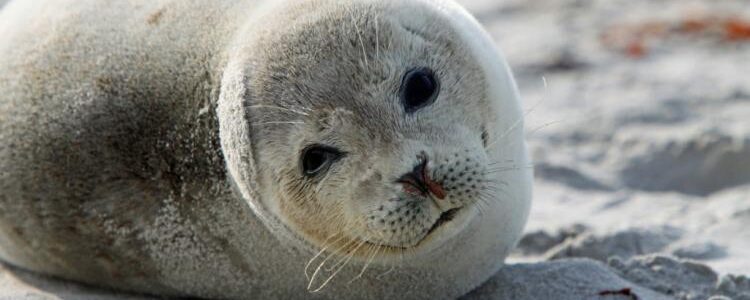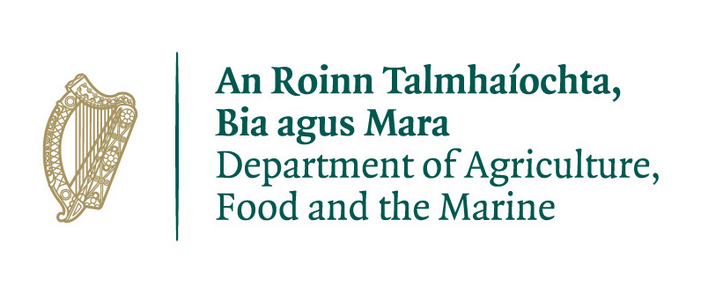
Marine Mammals
In Ireland, there are two groups of mammals that inhabit the marine environment; cetaceans (whales, dolphins, and porpoises) and pinnipeds (sealions, walruses, seals).
Irish cetaceans include six species of baleen whale and eighteen species of toothed whale, including five species of beaked whale. 24 species of cetacean have been recorded in Ireland. Details of these cetacean species can be found at www.iwdg.ie
From the pinnipeds group, Ireland has only two species of seals; the Common (or Harbour) Seal and the Grey (or Atlantic) Seal. Both species have established themselves at terrestrial colonies (or haul-outs) along all coastlines of Ireland. They have adopted a semiaquatic life; they rest, breed, and rear young on land, but the majority of their time is spent in the water.
First year mortality for young seals varies between 34-60% depending on location. Killer whales and sharks are among their natural predators, but seal populations are under far greater threat through their interaction with man, particularly where commercial fishermen see seals as competition in pursuit of dwindling fish stocks. This has resulted in some illegal ‘culling’ of seals.
In 1914 Grey seals became the world’s first officially protected species. Ireland has a responsibility towards the well-being of Grey seal colonies, as half the European population is found around the country’s coast.
Marine Mammal Crimes
Marine mammals are protected by law in the Republic of Ireland under the Wildlife Acts 1976 to 2012.
The protection afforded to the various marine mammals in Ireland is summarised below:
| Harbour Porpoise | Annex II of EC Habitats Directive Annex IV of EC Habitats Directive Protected species of Wildlife (Amendment) Act OSPAR List of Threatened and Declining Species and Habitats |
| Bottlenose Dolphin | Annex II of EC Habitats Directive Annex IV of EC Habitats Directive Protected species of Wildlife (Amendment) Act |
| All Cetacea | Annex IV of EC Habitats Directive Protected species of Wildlife (Amendment) Act |
| Grey Seal/Harbour Seal | Annex II of EC Habitats Directive Protected species of Wildlife (Amendment) Act |
Unless authorised to do so under a valid licence/permission/derogation granted by the Minister for Arts, Heritage and the Gaeltacht under the Wildlife Acts 1976 to 2012 it is unlawful to:-
- Hunt or Kill (or attempt to do so) a marine mammal otherwise than under and in accordance with a permission or licence granted by the Minister for Arts, Heritage and the Gaeltacht
- Wilfully interfere with or destroy a marine mammal at its breeding and resting place
- Possess a marine mammal, whether alive or dead, or any part, product or derivative thereof other than one lawfully taken pursuant to the Wildlife Acts
- Sell, keep or offer for sale, or engage in taxidermy in respect of a marine mammal or any parts, products or derivatives thereof other that by a licensed wildlife dealer with a lawfully acquired specimen
Wildlife Licensing Unit,
National Parks and Wildlife Service,
Department of Housing, Local Government and Heritage
National Parks and Wildlife Service
90 King Street North
Dublin 7
D07 N7CV
Email: wildlifelicence@npws.gov.ie
Call: 01 888 2000
Recording evidence at the Crime Scene
Assessing whether a criminal offence has taken place may not always be straight forward and other possibilities such as natural deaths, predation and legal hunting should be considered.
If you come across a wildlife crime scene or a dead bird or object that may be related to a wildlife crime, every piece of information is – or might be – important, but it needs to be recorded properly and accurately for the authorities to have a chance of prosecuting an offender.
Before you do anything else it is very important that:
- You do NOT put yourself in danger by approaching anyone you suspect of committing a crime – they may be violent and/or aggressive.
- You do NOT touch any dead birds or animals. They may be poisoned baits or victims of poisoning. Many poisons (e.g. Carbofuran) are extremely dangerous to us as well as wildlife in even very small amounts and can be absorbed through the skin.
- You do NOT disturb the scene by walking around unnecessarily – small pieces of evidence (cigarette ends, footprints, the marks left by a spade etc) may be lost or trampled into the mud or grass.
- You do NOT move any items at the scene – unless asked to do so or an animal or human”s welfare is/may be compromised by leaving it at the scene.
- You do NOT mark the site (e.g. with a white plastic bag) Although being able to see a marker from a distance might sound like a good idea, it will also alert an offender that someone has been at the site and they might go back and remove evidence.
- You do NOT do anything illegal yourself – leave crime to the criminals!
Record the date and time
- Record the transport
Do this as soon as possible, as suspects can be traced from the registration number
Photograph/write down any vehicle registration numbers that are or might be related to the incident. It is legal to record a registration number if you suspect that the vehicle has been or may be used in a crime. - Record the person
Recording the offender’s face is important of course, but their clothing, the bags they’re carrying, the equipment they’re using are all important too. - Record the scene
Take photographs or video of the scene using a mobile phone or camera etc (or make as accurate a sketch as possible). - If possible try to cover any items, perhaps with vegetation, to make them safe; but make sure you don’t disturb the crime scene in the process!
- If photographing an object, try to put something beside it for scale (e.g. a coin or notebook) providing it won’t disturb the crime scene.
- Record the location
It is particularly important to record locations accurately (apps that provide GPS data are available for most smartphones)
In an urban area note the address or a description of the location. In the countryside take wide angle photographs of any landmarks; a tree, a distinctive fence line, a hill. - Even if in doubt take a photograph and email it to the National Parks and Wildlife Service WildlifeEnforcement@npws.gov.ie
Reporting a marine mammal crime
To report suspected illegal marine mammal activity contact the National Parks & Wildlife Service
Tel: (01) 888 2000
Contact numbers for your local NPWS Conservation Ranger HERE
If you can’t reach NPWS personnel call An Garda Síochána:
If the crime is in progress or about to happen, or if the offender is still at the scene or has just left call 999 or 112
If the event is finished then contact the National Bureau of Criminal Investigation on envi.wildlife.crime@garda.ie and call your local Garda Station (Garda Stations Directory) or the Garda Confidential Telephone Number 1800 666 111
[Although it will assist the NPWS and Gardaí if you provide as much information as possible, you do not have to give your name if you ring to report an incident.]
| If the mammal is alive and is injured, also call a wildlife rehabilitator/vet from the contacts page of Irish Wildlife Matters | Irish Wildlife Matters |
| If you witness any crime involving a seal please also contact | Seal Rescue Ireland or The Irish Seal Sanctuary |
| For cetacean crimes please also contact the Irish Whale and Dolphin Group | www.iwdg.ie |
For more information on reporting a crime click HERE
